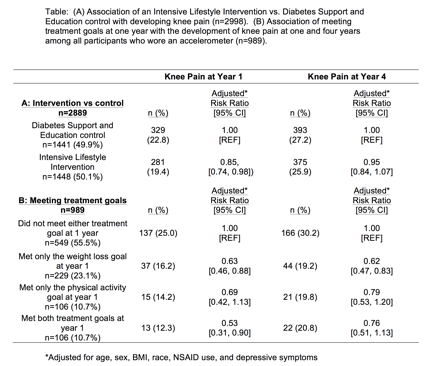Background/Purpose: Weight loss combined with exercise is effective for reducing pain and improving function in adults with knee pain. However, it is not known if this same approach prevents the development of knee pain among those at high risk. We examined whether an intensive weight loss and exercise intervention prevented the development of knee pain among overweight and obese adults with type II diabetes, a group at risk for knee pain due to excess weight.
Methods: We carried out a secondary analysis of the Look AHEAD study, a multi-center randomized intervention trial of an intensive lifestyle intervention (ILI) vs. diabetes support and education (DSE) comparison group in adults with a BMI > 25 kg/m2 and type II diabetes. Participants in the ILI had goals of reducing weight by 7% and participating in > 175 minutes/week of physical activity by one year. We included subjects with no knee pain at baseline and examined to what extent the ILI group protected against developing knee pain at year 1 and 4. Knee pain was assessed by asking “Have you had any pain or discomfort in your knees in the past month?” In a second separate analysis, we examined whether meeting treatment goals, i.e., weight loss only, physical activity only, or both weight loss and physical activity, reduced the risk of developing knee pain compared with those not meeting any goal at year 1 and 4. This second analysis was performed in a subset of 989 participants whose clinic sites provided an accelerometer.
Results: Of the 2998 participants with no knee pain at baseline (age 58.5±6.7, men 44.9%, BMI 35.1±5.6) 50.1% were assigned to the ILI group and the remainder to the DSE. Subject characteristics were similar between groups at baseline. At year 1, ILI participants were 15% less likely to develop knee pain compared with. At year 4, this decreased to 5% and was not statistically significant. In the second analysis, participants meeting both weight loss and physical activity goals had 47% less risk of developing knee pain at year 1. Only those meeting the weight loss goal at year 1 had less risk that met statistical significance of developing knee pain at year 4.
Conclusion: An intensive lifestyle intervention of diet and exercise prevented the development of knee pain among those at high risk in the short-term. Weight loss appears to have the most relevant for preventing the development of knee pain over four years.
Disclosure:
D. White,
None;
T. Neogi,
None;
W. J. Rejeski,
None;
M. Walkup,
None;
C. E. Lewis,
None;
M. Nevitt,
None;
C. Foy,
None;
D. T. Felson,
None.
« Back to 2014 ACR/ARHP Annual Meeting
ACR Meeting Abstracts - https://acrabstracts.org/abstract/can-knee-pain-be-prevented-through-diet-and-exercise-among-those-at-high-risk-the-look-ahead-study/
